Another peek inside the Student Innovation Center
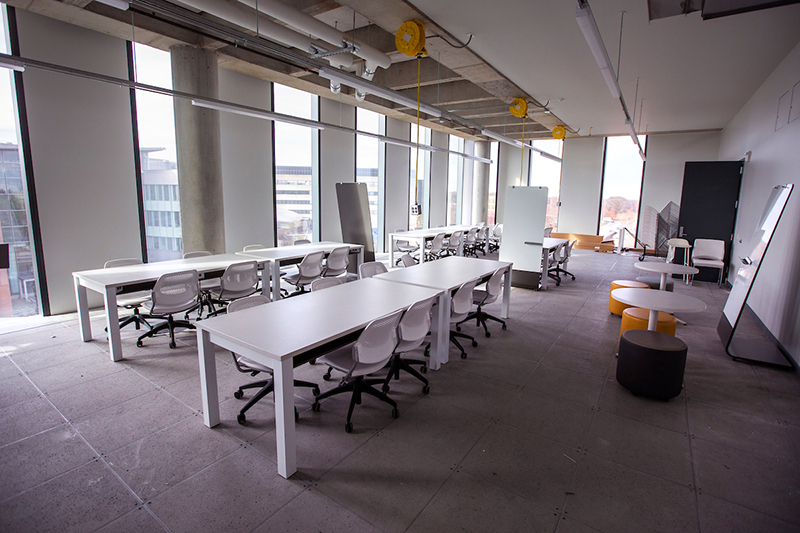
A fourth-floor industrial design studio in the northwest corner of the Student Innovation Center was partially furnished this week. Photos by Christopher Gannon.
Sidewalks and driveways are in, the lawn is seeded and the construction fence is gone. But interior work at the Student Innovation Center continues in various phases of completion as spring semester gets underway. Up on the third and fourth floors, workers are cleaning interior glass, wiping construction dust from sills and railings, and uncrating equipment and furniture. The second floor awaits them when they finish the top floors. Director Jim Oliver said he and his staff hope to move into their second-floor offices later this month.
The main and basement levels remain construction zones, with painting, tiling and floor work still occurring. Equipment for specific labs will arrive through early March. One example is machinery for three collaborative "makerspace" labs on the lower levels, as well as security systems that allow trained students to use it. Also pending are installations of a buildingwide dust collection system and audio/visual technology -- lots of it!
Oliver said a handful of spring semester classes that start in other campus locations will relocate to the Student Innovation Center during spring break. He estimates the building will be open, without restrictions, to the campus community around April 1, in advance of an April 17 grand opening celebration.
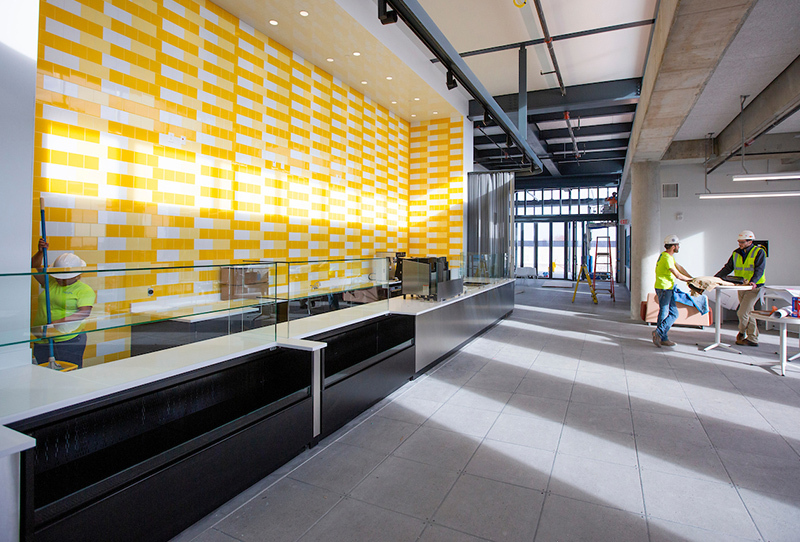
The fourth-floor student-run café (apparel, events and hospitality management department).
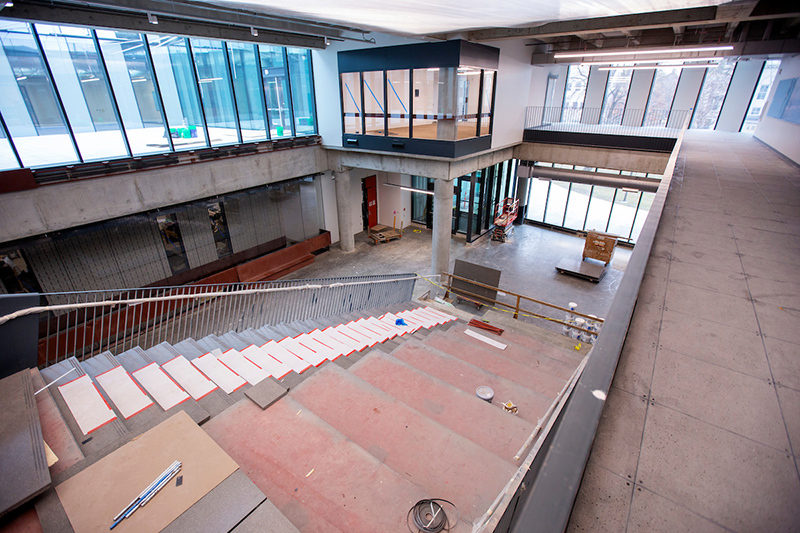
Second-floor view of the under-construction stepatorium, descending toward the Student Innovation Center's east door. Pictured at the top left is the central outdoor courtyard.
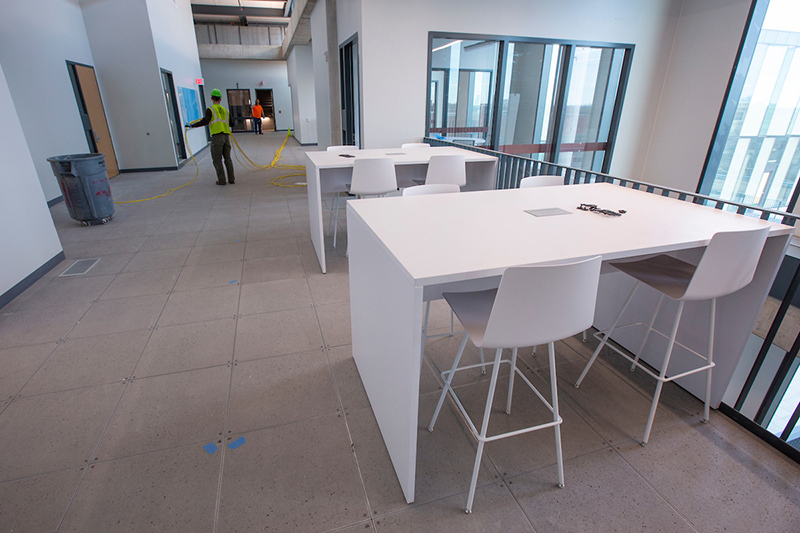
Interaction spaces, like this one along a fourth-floor corridor, will be set up throughout the Student Innovation Center.
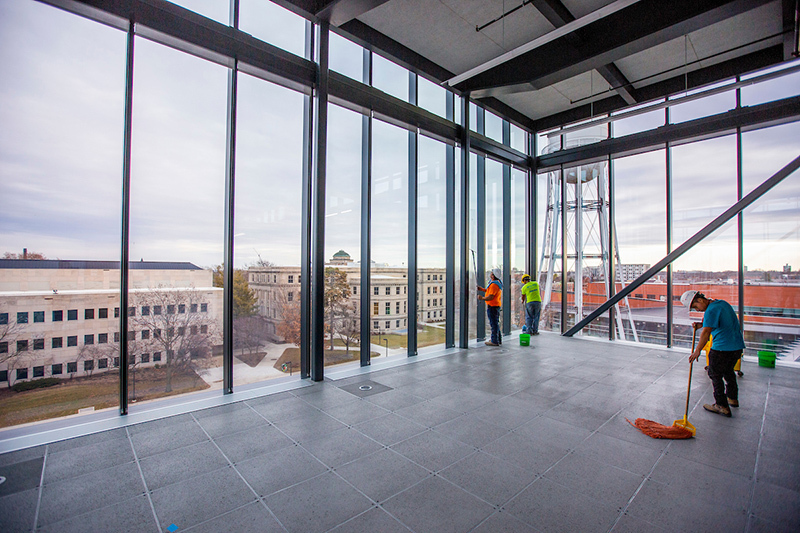
Workers clean the glass walls and floor of an east side meeting-room-with-views at the Student Innovation Center.
Required registration ensures support for international travel
A new policy effective Jan. 1 requires faculty, staff and students to preregister all Iowa State-sponsored trips they take outside the U.S. The change will ensure travelers are insured and connected with useful resources before they depart.
Registering international travel and enrolling in centrally funded medical and emergency insurance had been encouraged, but the new policy developed by the risk management office in consultation with academic leaders makes it mandatory, said Shaun Jamieson, international risk analyst.
An audit of fiscal year 2018 travel comparing reimbursements to registrations found about 75% of 1,284 employee trips abroad were registered, Jamieson said. (Nearly all student trips were registered because most are arranged through the study abroad center.) Auditors recommended that employees document international travel plans before departure, which prompted the mandatory registration policy.
The policy explicitly states that registering a trip doesn't give the risk management office authority to deny travel plans. It's about preparation, not approval, Jamieson said.
"It's not that we're trying to deny travel to high-risk destinations. We just want to be able to provide support to those travelers," he said.
Insurance and more
Registering automatically enrolls employees in international travel insurance, which covers emergency medical care, evacuations in the case of a natural disaster or political unrest, and the cost of delays and interruptions. Travelers also are signed up for custom safety and security alerts provided by AlertTraveler, which can be delivered by email or smartphone.
Using information from AlertTraveler that considers health and security concerns, destinations are assessed by risk level. For trips to moderate-risk areas, travelers are encouraged to review their itinerary with the risk management office. For travel to high-risk areas, an itinerary review is required and will be shared with college or unit leadership. A required itinerary review for severe-risk destinations is shared with unit-level leadership and the respective senior vice president. No itinerary review is necessary for trips to areas with minimal or low risk.
Over the last nine months, 59 registered trips -- about 5% -- were high- or severe-risk, Jamieson said. Because most employee travel is to conferences, the bulk of those trips were to low-risk cities in high-risk countries, and the itinerary review was a simple briefing by phone or email, he said. Just a handful required a close review, typically in a face-to-face meeting.
"Most of those faculty traveling to high- or severe-risk destinations already know me, and we've had conversations," Jamieson said.
Registering trips gives the university a way to ensure compliance with federal export control law, which restricts what technology and materials can be taken to certain countries. It also offers a chance to provide employees with laptops designed for use abroad, satellite phones and translation apps, Jamieson said.
"It allows us to coordinate a lot of resources," he said.
Defining business travel
The policy outlines what qualifies as Iowa State-sponsored travel, a new definition that in some cases includes trips the university isn't funding. Employee travel is considered ISU-sponsored if:
- It's paid partially or fully by ISU-controlled funding
- It's part of an academic credit-bearing activity, such as study abroad
- It's undertaken by a recognized student organization or an official ISU organization such as athletic teams, sports clubs, and academic or administrative departments
- An employee or volunteer is exercising official responsibilities
- A faculty member is engaging in research, teaching or other activity that's part of their ISU employment, scholarship or service
Self-sponsored travel that doesn't meet any of those criteria, such as tourism or visits to a home country, aren't covered by the policy. Travel as an outside consultant or for work on behalf of other institutions or companies is excluded, unless the work is connected to an ISU-sponsored project.
The policy covers trips to U.S. territories.
How to register
Trips are registered online at the international travel portal website. The main menu for Workday's expenses section also links to the registration site. Employees should register international trips as soon as they're aware of travel dates and destinations.
Jamieson said the biggest concern he heard during development of the policy is that it would be an additional hurdle for employees. Anyone can delegate another employee to register trips for them, however. He thinks the registration shortfall identified in the FY18 audit is due to a lack of awareness.
"I suspect the vast majority of that 25% just didn't know about it," he said.
New role
The policy came about in part because of a new focus on international travel risks, an emerging concern in higher education. Jamieson was hired in fall 2018 as Iowa State's first international risk analyst. There were about 20 full-time international risk positions at universities seven years ago, and now there are 120, he said.
"It's starting to grow pretty fast," he said.
Jamieson said he's available to speak to classes or other groups on topics such as traveling safely in other countries or researching areas to visit. Contact him at shaun@iastate.edu or 294-6916.
Space heater options continue to evolve
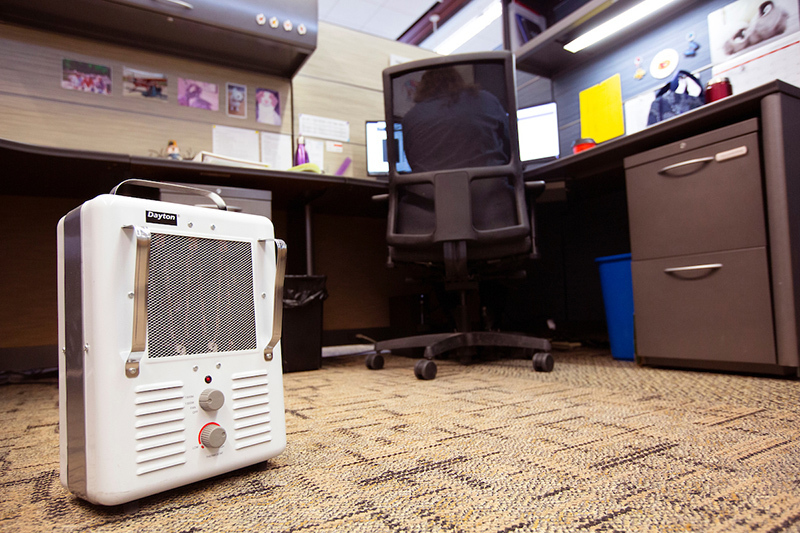
This space heater manufactured by Dayton is approved for use in campus offices. Photo by Christopher Gannon.
When outside -- and sometimes, office -- temperatures dip this winter, resist the impulse to turn on your inexpensive but hardy space heater. Campus energy and safety experts recommend safer, smarter options. While the university policy forbidding all office space heaters is gone and several models are approved for office use, there still are guidelines for improving the comfort of your work space.
The first step should be a call to facilities planning and management (FPM) to make sure a mechanical problem -- in your building or neighborhood -- isn't responsible for a chilly workspace this time of year. Call 294-5100 or use FPM's report a problem online option, said Brian Housholder, assistant director for facilities maintenance and operations.
Questions
Call 294-5100 to request a check on your building's heating system. Send questions about space heaters to Troy Carey, EHS, 294-9495.
He cautioned against using space heaters before an FPM team has a chance to look into the problem. Sometimes, FPM staff even can fix a problem remotely when it's brought to their attention.
"You can put a space heater in a room and actually exacerbate your cold issues," he said. "If the room is set for 68 or 70 degrees and you're trying to heat above that, the air conditioning (or its equivalent) will try to kick in.
"The two systems are ignorant of each other. You might as well open your window and throw $100 bills out," Housholder said. "It can get quite expensive, quickly. Departments may not see that bill, but colleges do."
Gilman and Science I halls are examples of older buildings with systemic issues in the heating/cooling system for which people assume there's no solution, he said.
"They'll plug in space heaters to treat the symptom," Housholder noted. "Where it's appropriate, we're happy to let people use approved space heaters, but sometimes people just ignore the bigger problem.
"Even if the solution is complicated, that doesn't mean we can't do it," Housholder said. "If it requires funding, we can put it on the list until we have the funding."
Approved space heaters
The fire safety team in environmental health and safety (EHS) has approved two space heaters for office use. They can be purchased from the Grainger catalog in cyBUY, which now is accessed through the procurement icon in Workday. The two models are:
- Portable electric heater by Dayton, $80, Grainger item #3VU33
- Portable electric heater by TPI Corp., $64, Grainger item #31TR33
The Dayton space heater also is available through the university's Central Stores.
Troy Carey, fire safety officer in EHS said space heaters used in campus buildings have to meet standards set by the state fire marshal. Two key requirements have to do with the appliance itself:
- It is UL listed and labeled.
- Its heating element must not exceed 212 degrees Fahrenheit.
Three others are about correct use of the space heater:
- It's plugged directly into the wall (no multi-plug power strips or extension cords).
- Combustible materials, including wastebaskets, are at least 3 feet away.
- It's operated only in the manner for which it is listed.
Several years ago, when a radiant heat panel was the only approved model, Carey's team approved its first fan-driven space heater, the Dayton product. He said he's in the final stages of approving another similar model by TPI Corp. And there could be others.
"We would look at whatever someone wants to send us, check out the product specs and give them a yes or no," Carey said. "We'd just like them to ask before they buy them."
He said he has rejected a few models for not meeting fire marshal standards. But employees may send an email that includes a link to a product website and he'll review it.
From a utilities perspective, Housholder said another problem with space heaters is they overload electrical circuits, particularly in older buildings. Multiple space heaters in an office suite will trip breakers. Power strips aren't rated for space heater use, and most are intended for office equipment, such as desk lamps or computer monitors.
State legislative session opens next week
State relations officer Carolann Jensen will spend a lot of time talking about Iowa State at the capitol complex in Des Moines this semester. That's where the state Board of Regents' appropriations funding requests, including ISU's portion, will be considered by the Iowa Legislature. The 2020 legislative session opens Monday, Jan. 13.
Contact information
Carolann Jensen
cjensen3@iastate.edu
515-250-2585
Twitter, @AllianceIowaSt8
"As an alumna, I am 'Forever True' and am excited to share my passion for Iowa State," Jensen said. "There is a lot to be proud of here at ISU. I love telling the stories of our successes. I look forward to helping legislators learn about the huge impact Iowa State has in all 99 counties."
Funding requests
Jensen outlined four areas for Iowa State's fiscal year 2021 legislative budget requests:
- General university appropriation
- Direct appropriations for special purpose units
- Economic development support
- College of Human Sciences construction project
Iowa State is requesting $181.6 million in general operating funds, an increase of $7 million. Direct appropriations funding does not change, but Jensen will ask legislators to move the livestock disease research line item ($172,844) from the education appropriations subcommittee to the agriculture and natural resources appropriations subcommittee.
Iowa State and the University of Iowa are requesting full funding of a joint biosciences innovation program that received $1.1 million of a requested $4 million last year. ISU would use $3 million of those economic development state dollars to lead the work on three of the four bioscience platforms -- biobased products, precision and digital agriculture, and vaccines and immunotherapeutics -- while Iowa spearheads work on medical devices.
ISU is asking for a $30 million commitment -- $10 million per year for three years -- for a College of Human Sciences building plan. The $55 million project, which would replace LeBaron Hall and renovate a portion of MacKay Hall, includes $15 million in private support and $10 million in university funds.
How to help
Jensen said employees can help her demonstrate Iowa State's impact on the state.
"I collect success stories about students, faculty, staff and projects to share with the hometown legislators," she said.
Jensen said her role provides a central point of contact to help ISU have a succinct and consistent message with legislators. She encouraged faculty and staff to let her know when legislators contact them for information about Iowa State.
"It helps if I know what legislators may be focusing on or are interested in," she said.
Related stories
- Exercising your political expression rights while respecting ISU policy, Oct. 10, 2019
- Funding request to replace LeBaron Hall heads to state, Sept. 26, 2019
- Welcome: Carolann Jensen, Aug. 29, 2019
